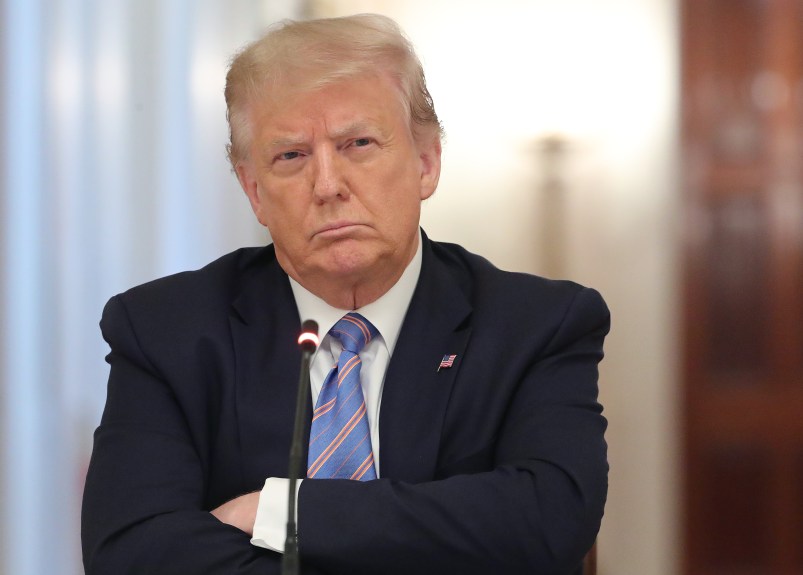The Supreme Court last week rejected the President Trump’s claims of total immunity from the criminal process, but a hearing Thursday in New York previewed what could be the next flashpoint in the proceedings over a subpoena for Trump’s financial docs.
Trump’s personal lawyer stressed during the teleconference before U.S. District Judge Victor Marrero that he believed the President was entitled to discovery as he continued to the litigate the grand jury subpoena for Trump’s financial records.
The idea drew vigorous pushback from the Manhattan District Attorney’s office, which issued the subpoena as part of its investigation into hush money payments during the 2016 campaign.
Pointing to the Supreme Court’s recent opinion, the D.A. office’s general counsel Carey Dunne said that Trump was just like the CEO of any private company whose records had been subpoenaed.
“And a person like that, if he doesn’t like his subpoenas that he received, he doesn’t get to take the D.A.’s deposition,” Dunne said. “Essentially, what they’re proposing here is a discovery campaign.”
The Trump team first floated the idea that they could pursue discovery in this next phase of the legal fight in a proposal submitted jointly earlier this week.
The proposal came after the Supreme Court ruled that sitting presidents are not immune from criminal proceedings — the initial claim that Trump brought to block the subpoena.
The Supreme Court opinion said that the case could go back to the district court so that Trump could seek to block the subpoena on grounds more narrow than that far-reaching argument, if he so chose.
The Wednesday joint submission made clear Trump intended to so, in an amended complaint that will be filed by July 27.
The current legal fight centers on subpoenas issued last August compelling Trump’s accounting firm Mazars USA, LLP and his banks Deutshe Bank and Citi to produce records related to his personal financial conduct, his family’s and his businesses’. A similar fight is being waged over congressional subpoenas seeking much of the same information.
At Thursday’s hearing, the judge tried to get Trump and the D.A.’s office to weigh in on the potential for several other arguments Trump could make to challenge the subpoena.
Trump’s personal lawyer, Will Consovoy, indicated it was possible that Trump could bring any of the possible arguments the judge laid out, which included claims that the subpoena was overbroad, that it was issued in bad faith, or that it amounted to retaliation.
“We will raise some of [those claims],” Consovoy said. “But whether we raise all of these arguments has not yet been determined.”
He did stress however that a discovery request was likely to be part of their game plan.
“We do think the issue of discovery is important,” Consovoy said.
He referenced a case cited in the Supreme Court decision that Consovoy said raised the “serious issue” of whether it was unfair to ask a “party to challenge a subpoena without access to at least some information about its nature and scope.”
He mentioned a declaration the D.A.’s office filed earlier in the case about its investigation that so far only the judge has been able to view in full. Consovoy said that Trump may seek to view some of the portions still redacted. He also floated that “interrogatories or something in that direction” would be appropriate as Trump’s challenge of the subpoena continued.
When it was Dunne’s turn to speak, he discouraged any delay that would drag out the proceedings longer than the briefing schedule he and the Trump team had agreed to. Beyond the president’s involvement, Dunne raised the possibility that the statute of limitations would prevent his office from prosecuting others linked to the conduct being investigated, if Trump was successful in keeping the grand jury proceedings tied up in litigation.
“Let’s not let delay kill this case,” he said.







“But it’s all we’ve got left,” Consovoy protested.
He sure wants to keep these docs under wrap.
He has everything to lose and little to gain.
Such a big defeat that the Supreme Court inflicted on Trump… they even told him how to delay things forever
Another day, another lame excuse.
Well, he never was going to do what was ordered by the supreme court.
This one should piss Roberts off, and be a wake-up call that if Trump’s re-elected, Roberts’ court is going to be totally irrelevant.